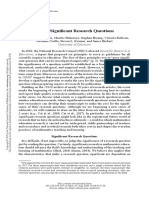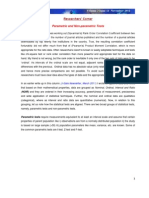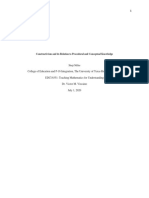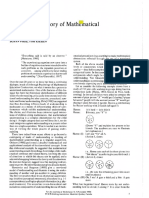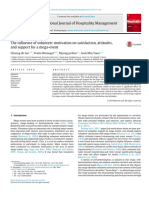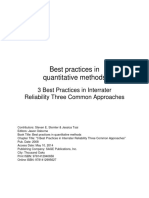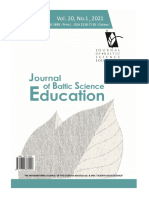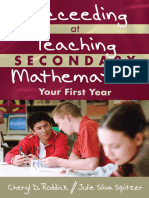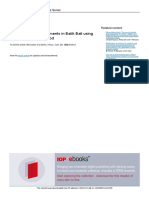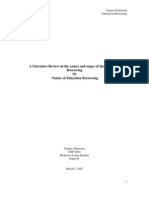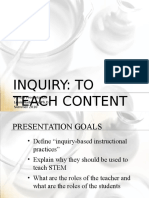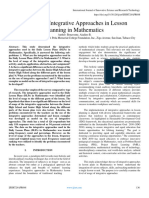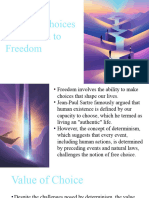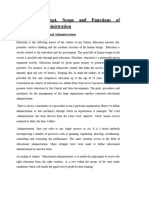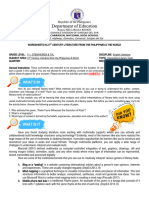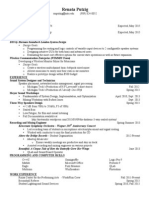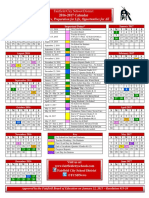The Use of Integrative Approaches in Lesson Planning in Mathematics
The Use of Integrative Approaches in Lesson Planning in Mathematics
Volume 9, Issue 4, April – 2024 International Journal of Innovative Science and Research Technology
ISSN No:-2456-2165 https://doi.org/10.38124/ijisrt/IJISRT24APR048
The Use of Integrative Approaches in Lesson
Planning in Mathematics
1
Bonavente, Aladino B.;
Graduate Studies Thesis: Daniel B. Peña Memorial College Foundation, Inc., Ziga Avenue, San Juan, Tabaco City
Abstract:- This study determined the integrative methods which helps students grasp the practical applications
approaches used in the Daily Lesson Plans (DLPs) in of mathematical concepts. This relevance not only increases
Mathematics. Specifically, it answered the following sub- engagement but also demonstrates the significance of
problems: 1. What are the integrative approaches used in Mathematics in daily life. By connecting Mathematics to other
the Daily Lesson Plans (DLPs) in Mathematics? 2. What is disciplines such as science, technology, or arts, students
the level of usage of the integrative approaches along: develop a broader perspective on how knowledge intertwines.
activity, analysis, application, abstraction, and
assignment? 3. Is there a significant difference on the level This holistic understanding encourages critical thinking
of usage of the integrative approaches between the Junior and nurtures a multidimensional approach to integrative
High School and Senior High School along the different problem-solving. Integrative approaches spark curiosity and
parts of the lesson plan? 4. What are the problems motivation by presenting Mathematics in dynamic and
encountered by the teachers on the use of integrative relatable ways. Students are more likely to engage deeply
approaches? and 5. What lesson exemplar as model on the when they see the subject's connections to their interests and
use of integrative approaches may be developed? passions. Integrative lesson plans cater to various learning
styles, accommodating visual, auditory, kinesthetic, and
The researcher employed the survey-comparative interpersonal learners. The incorporation of different subjects
type of research. The integrative approaches used in the provides multiple avenues for students to grasp mathematical
Daily Lesson Plans (DLPs) in Mathematics were identified concepts that allow teamwork and collaboration. Collaborative
and the level of usage to the different parts of the lesson. projects fostered by integrative approaches promote
The hypothesis that there is no significant difference on the teamwork, communication, and creativity which are essential
level of usage of the integrative approaches between the skills for success in modern workplaces and society.
Junior High School and Senior High School along the
different parts of the lesson plan were also tested. The implementation of integrative approaches in lesson
Likewise, the problems encountered by the teachers on the planning is aligned with diverse educational frameworks and
use of the integrative approaches determined and lesson policies that reinforce its significance in contemporary
exemplar was developed as model on the use of integrative classrooms. As highlighted in Sustainable Development Goal
approaches. The study has a total of 126 respondents but (SDG) framework, the educational aspirations are prominently
only 118 responses were retrieved or 94 percent retrieval embodied in the Sustainable Development Goal 2030 (SDG
rate. The data on the integrative approaches used in the 2030) aiming to ensure integrative and equal education that
Daily Lesson Plans (DLPs) in Mathematics was treated fosters opportunities for lifelong learning. 1 The goal is
using frequency count and percentage. However, on the dedicated to providing equal and equitable education and
level of usage of the approaches in the lesson, frequency fostering continuous learning opportunities.2 The commitment
count and weighted mean were used. Frequency count and to SDG 2030 has urged educators to embrace innovative
ranking were utilized to identify the problems encountered pedagogical strategies in Mathematics, such as Problem-Based
by the teachers. Learning (PBL), Project Based Learning (PrBL),
contextualization, mathematical modeling, use of technology,
I. INTRODUCTION interdisciplinary connection, real world-data analysis, cultural
and historical context, extra-curricular activities and hands-on
In recent years, a paradigm shift towards more holistic activities.
and interdisciplinary teaching techniques has evolved in the
field of education. The integration of subjects is no longer This study acknowledges the use of integrative
seen as an abstract concept but rather as a pedagogical approaches in lesson plans in Mathematics to better
approach that enhances the depth and breadth of students' understand the integration of various subjects, skills, and
learning experiences. Integrative approaches in Mathematics teaching methods into a single lesson or unit. The purpose is to
lesson plans extend the boundaries of traditional teaching carefully examine the level of usage of integrative approaches
IJISRT24APR048 www.ijisrt.com 136
Volume 9, Issue 4, April – 2024 International Journal of Innovative Science and Research Technology
ISSN No:-2456-2165 https://doi.org/10.38124/ijisrt/IJISRT24APR048
on the different parts of the lesson plan as part of the teachers, urging educators to consider the socio-cultural
curriculum standards, learning objectives, and teaching context influencing students' comprehension and mastery of
mandated by the Department of Education. This study will mathematical content. In essence, the integration of activity
further explore the problems encountered by teachers in the theory emphasizes the transformative role of teaching,
use of integrative approaches in lesson planning as part of the asserting that effective instruction involves not only delivering
teaching approach to create a more holistic and engaging information but also guiding and facilitating activities to
learning experience for students. enable active student engagement and mastery of
mathematical content, seamlessly aligning with the integrative
II. THEORETICAL FRAMEWORK nature of the study.
One of the theories that supports the study is the activity Moreover, the interdisciplinary approach supports this
theory. Activity theory has its origins in the classical German study. Main (2023)50 emphasized that the practical situation
philosophy of Kant and Hegel, the dialectical materialism of that students encounter in the learning process can make
Marx, and the socio-cultural and socio-historical tradition of connections between ideas across different disciplines and
Russian psychologists such as Lev Vygotsky in 1930, Alexey boundaries using curriculum integration associated with the
Leont'ev in 1974, and Yrjö Engeström in 1987 (Nguyen Phu real world. In 1933, a method of teaching that was strongly
Loc et al., 2022)47. When discussing how to improve the advocated by John Dewey involved students in projects, and
quality of teaching activities, we must consider the investigations that required the use of more than a single
relationship among students, knowledge to be learned academic discipline. Dewey believed that to be educative, it
(teaching content), and the impact of teachers. Kim (2017)48 was necessary that such projects present problems that awaken
believes that each teaching content is closely related to new curiosity and create a demand for information. There is a
specific activities that students engage in while forming and renewed interest in this approach because of the need to find
applying that content. As a result, teaching is essentially alternative ways to address improvements in student
discovering latent activities in content and mapping out a path achievement and the quality of instruction to raise test scores
for learners to dominate that content. Through activity theory, without ―teaching-to-the-test. As a result, many teachers are
Vygotsky (2012)49 has provided a systematic theoretical incorporating aspects of interdisciplinary instruction in their
framework that clearly shows the relationship between the teaching. The interdisciplinary approach accommodates
three constituent elements of an activity, namely subject, students’ diverse strengths and learning preferences and offers
object, and tool. It echoes the activity theory's emphasis on many opportunities for the differentiation of instruction.
recognizing the interconnected elements of subject, object, and
tool within a given educational activity. This perspective Incorporating an interdisciplinary approach in integrative
encourages educators to go beyond the surface-level delivery Mathematics lesson planning entails connecting mathematical
of information and consider the dynamic and interactive nature concepts with real-world scenarios, as emphasized by Main
of learning activities. and inspired by John Dewey's teaching method. This approach
advocates for the integration of various disciplines which
Incorporating activity theory into the study on integrative encourages teachers to design lessons that involve projects and
approaches in Mathematics marks a shift from traditional, investigations requiring the application of mathematical
information-centric teaching to a dynamic and interactive principles in connection with other academic areas. The
educational paradigm. Effective teaching, according to activity transformed interest in this approach starts from the desire to
theory, extends beyond knowledge transmission to include move beyond teaching solely for standardized tests which
recognizing and fostering activities that empower students in fosters a more comprehensive and engaging learning
actively comprehending and applying mathematical concepts. experience. By embracing interdisciplinary instruction,
This perspective acknowledges learning as an active process, educators acknowledge and cater to students' diverse strengths
prompting teachers to transition from conveyors of and learning preferences that allow for a personalized and
information to facilitators and guides of learning activities. differentiated approach to Mathematics education.
Teachers are entrusted with unveiling latent activities in
mathematical content and creating an environment conducive When it comes to the analysis phase in lesson planning, a
to active student participation through problem-solving, philosophical approach on questioning is one of the
collaborative projects, and hands-on applications. This aligns appropriate strategies on students. The Socrates' approach to
with the integrative nature of the study, emphasizing the questioning, originating in 470-399 BC, revolves around
interconnectedness of mathematical concepts and skills. disciplined and thoughtful dialogue. Socrates believed that
engaging students in the disciplined practice of thoughtful
Activity theory recognizes that students' engagement questioning facilitates logical examination and determination
involves interconnected activities contributing to a deeper of the validity of ideas. In this method, the teacher assumes
understanding. Additionally, it emphasizes the complex ignorance of the topic to prompt a dialogue with students, a
interplay between students, teaching content, and the impact of
IJISRT24APR048 www.ijisrt.com 137
Volume 9, Issue 4, April – 2024 International Journal of Innovative Science and Research Technology
ISSN No:-2456-2165 https://doi.org/10.38124/ijisrt/IJISRT24APR048
form of 'acting dumb' that encourages students to develop a The integration of activity theory in lesson planning
comprehensive understanding of the subject. signifies a shift from traditional teaching methods towards a
more dynamic and interactive educational paradigm. By
The Socratic questioning approach proves effective in emphasizing the interconnected elements of educational
exploring ideas in depth and is applicable at all educational activities and promoting active student engagement, this
levels, serving as a valuable tool for teachers. This method approach aligns with the integrative nature of Mathematics
utilized at various points within a unit or project fosters education. Furthermore, the incorporation of interdisciplinary
independent thinking and grants student’s ownership of their instruction, Socratic questioning, and experiential learning
learning. It cultivates higher-level thinking skills as students enhances integrative approaches by connecting mathematical
engage in thinking, discussing, debating, evaluating, and concepts to real-world scenarios, encouraging thoughtful
analyzing content independently and collaboratively. Although dialogue and logical examination of ideas. These strategies
Socratic questioning dialogues may occur after introducing a transform the application phase into a dynamic, participatory,
unit, it necessitates teachers to establish active learning and reflective process, collectively enriching the learning
environments that prioritize and appreciate the role of critical experience.
thinking, mobilizing students' capacity to formulate intricate
thoughts and questions (Abdullah et al., 2022)51. III. REVIEW OF RELATED LITERATURE
In the context of integrative approaches in lesson As stated by Drobnič Vidic (2023)15, Mathematics serves
planning, the incorporation of Socratic questioning during the as a foundational subject that underpins various academic
analysis phase enhances the interdisciplinary nature of fields like engineering and science. Given this natural and
education by fostering thoughtful dialogue and logical effective relationship between Mathematics and other
examination of ideas. This approach encourages the seamless disciplines, the study focuses on the integration of Inquiry-
integration of mathematical concepts with other disciplines, Based Learning, Problem-Based Learning, and Project-Based
emphasizing the interconnectedness of knowledge. Socratic Learning within Mathematics education. Furthermore, it
questioning promotes independent thinking and active investigates how these approaches are connected to science
engagement, aligning with the goals of integrative lesson and engineering. Through a concise examination of these
planning to create dynamic, student-centered learning teaching methodologies and theoretical comparisons, the study
environments. By encouraging students to explore the broader aims to discern the distinctions in how these approaches are
implications of mathematical concepts and draw connections applied in Mathematics education and their attributes in
between subjects, this approach contributes to the fostering interdisciplinary connections with other academic
development of well-rounded learners capable of applying subjects.
knowledge across diverse academic domains.
Koberstein-Schwarz & Meisert (2022)2 asserted that the
Another theory that supports this study in the application promotion of planning competency is an essential task of
phase of lesson planning is the experiential learning theory of teacher education. Effective planning is not just about creating
David Kolb. Experiential learning, developed by Kolb in lesson outlines; it involves the ability to align educational
1984, is a paradigm for resolving the contradiction between objectives, adapt to diverse student needs, and employ various
how information is gathered and how it is used. It is focused instructional strategies. Prioritizing planning competency in
on learning through experience and evaluating learners in line teacher education ensures that educators are well-equipped to
with their previous experiences (Sternberg & Zhang, 2014)52. design engaging and effective learning experiences, ultimately
The paradigm highlights the importance of learners’ benefiting students and enhancing overall educational
participation in all learning processes and tackles the idea of outcomes.
how experience contributes to learning (Zhai et al., 2017)53.
Thus, effective learning occurs when meaningful
Kolb's experiential learning theory places a critical connections are established throughout the entire curriculum.
emphasis on active participation and engagement during the Often, students struggle to engage with subjects they deem
application phase of lesson planning. This means that the challenging. While certain disciplines may possess greater
traditional notion of learning as a passive absorption of complexity and abstraction, employing suitable teaching
information is transformed into a dynamic process where approaches can positively influence students' attitudes toward
students are actively involved in the application of knowledge. mastering these complex topics Gagic et al. (2019)3.
The theory advocates for collaborative and interactive tasks,
encouraging students to work together, share perspectives, and It was highlighted by Kaur (2019)4 that the need of
collectively apply theoretical concepts to real-world scenarios. integration of curriculum is a frequently felt need over time
This not only fosters a sense of shared learning but also but has never been able to taken up due attention by the
mirrors the collaborative nature of many professional curriculum planners while planning the curriculum on account
environments. of the vastness of approach, its difficult operational modalities
IJISRT24APR048 www.ijisrt.com 138
Volume 9, Issue 4, April – 2024 International Journal of Innovative Science and Research Technology
ISSN No:-2456-2165 https://doi.org/10.38124/ijisrt/IJISRT24APR048
and opposing view by groups who advocate the supremacy of can develop a deep-seated sense of responsibility for
academic excellence through specializations in specific environmental stewardship. Furthermore, Pehoiu highlighted
subjects over integration of subjects. Many times, the timing that such educational approaches are instrumental in
of introducing integration is questioned by traditionalist motivating individuals to actively engage with and address
academicians who argue that integration sometimes does more environmental issues. In essence, Pehoiu's work underscores
harm than good. Obviously, it is a superficial argument by how integrated education serves as a catalyst for instilling the
them as they know curriculum integration is not an easy necessary values and determination to tackle environmental
process but requires an extra edge with the curriculum challenges effectively.
practitioners.
In the Philippines, the implementation of K-12
Beane (2020)5 emphasized the longstanding connection curriculum, integrative lesson plans have been introduced.
between integrative approaches and progressive, democratic Due to the importance of Mathematics education across the
educational models in elementary and secondary schools. This nation, the Philippines is upgrading the Filipino learners to
connection encompasses various initiatives such as CORE global competitiveness by holistically developing them
Programs, the curriculum's experience-centered approach, and through the implementation of the new Philippine educational
numerous problem-centered courses. Currently, some system, the implementation of K-12 curriculum. This
integrative approaches are gaining traction, alongside reformation is mandated by Republic Act 10533, known as the
methodologies like project- and problem-centered activities, ―Enhanced Basic Education Act of 2013. One of the features
which have historical ties to integrative approaches. of the K-12 is the use of the spiral progression approach to
Nevertheless, the student-centered, democratic philosophy that ensure mastery of knowledge and skills after each level. The
characterizes integrative curriculum approaches has been implementing rules and regulation also state that ―the
diminishing due to the influence of bureaucratic subject-based curriculum shall be contextualized and global; and shall be
standards, testing requirements, and rigid curriculum flexible enough to enable and allow schools to localize,
mandates. indigenize, and enhance the same based on their respective
educational and social contexts‖ and ―the curriculum shall
According to Haapaniemi et al. (2019)8 “an essential skill ensure integrated and seamless learning wherein subjects are
in the twenty-first century is how to make sense of the taught from the simplest to complex in spiral progression
complex flood of information”. Students need to cultivate the wherein subjects are connected and integrated through grade
skill of linking fragmented information, which the authors levels (Official Gazette, 2019)16.
refer to as integrative thinking. This capacity is crucial for
their academic and cognitive development. It enables students A project commissioned by UNICEF and the Philippines
to make meaningful connections between disparate pieces of Department of Education Philippine conducted last March
knowledge. 2020 highlighted issues relevant to implementation of a skills
integration agenda – these included how they are integrated in
It was found out by Farzam & Allahdadi (2018)9, that the curriculum, teacher support mechanisms, approaches to
employing an integrative method in the instruction of assessment, and education governance and regulation factors.
Mathematics for primary school students through the The evaluation of existing practices showed that the
utilization of educational games yielded notable enhancements predominant approach of the Philippine education system has
in the quality of children's learning. The research indicated been at curricular level, and the main conceptual approach has
that this approach was highly effective in improving the been to integrate skills into the curriculum, rather than as
educational outcomes of young learners. By adopting an stand-alone areas of learning. The integration is within
integrative approach, where mathematical concepts were subjects, but in some cases also is planned within cross-
integrated into educational games, students were able to grasp disciplinary subjects. However, a notable area for future focus
mathematical principles more comprehensively. This is teacher support for professional development. The issues
innovative teaching method not only enhanced the overall raised questions on the diversity and utility of pedagogical
learning experience but also contributed to the overall strategies currently used in the Philippines.
educational success of primary school students. Farzam and
Allahdadi's findings underscore the significance of integrating Generic issues that face the Philippines' education system
interactive and engaging strategies in Mathematics education. are critical, specific issues include the applicability such as
Pehoiu (2019)10 underscored the significance of critical thinking and communication to multiple subject areas.
integrated education as a crucial tool for instilling the correct Findings showed that most teachers were unfamiliar with the
mindset, fostering responsibility, and igniting motivation Holistic Filipino Framework and the term “Holistically
regarding environmental matters. Pehoiu's emphasis centered Developed Filipino”, and were not aware of the seven 21CS
on the pivotal role of integrated education in shaping identified by DepEd. Some teachers reported that they
individuals' attitudes toward environmental concerns. The attended Learning Action Cell Sessions on the topic of 21CS.
author stressed that through integrated education, individuals However, they stated that the sessions did not contain detailed
IJISRT24APR048 www.ijisrt.com 139
Volume 9, Issue 4, April – 2024 International Journal of Innovative Science and Research Technology
ISSN No:-2456-2165 https://doi.org/10.38124/ijisrt/IJISRT24APR048
information about skills or strategies on how to integrate them. As indicated by Padillo et. al (2021)22, the essential
Although the majority displayed little familiarity with the pillars of the teaching and learning process are pedagogical
skills, upon being apprised of them, they reported that they try knowledge and content knowledge. The preparation of
to integrate the skills spontaneously in their lessons every day. students for lifelong learning hinges on gaining a deeper
A common theme was the need for professional development, comprehension of how pedagogy influences the learning
and concerns about class size and facilities impacting on their experience. Classroom planning is a fundamental component
capacity to teach the skills. of education, encompassing both the curriculum design and
behavior management aspects. Proficient classroom
The Philippines has placed an educational emphasis on management ensures a smooth teaching process, allowing
the “holistically developed Filipino”. The need to focus on educators to focus more on instructing and less on
supporting students to develop a broad set of competencies has administrative tasks. Beyond the ability to plan lessons
been acknowledged globally and refers to the knowledge, effectively, teachers should also possess the skills to deliver
skills, values and attitudes. Following this mandate, DepEd these lessons with impact. The adept utilization of teaching
Order No. 42, Series of 2017 National Adoption and resources and methods plays a crucial role in enhancing the
Implementation of the Philippine Professional Standards for quality of courses, ultimately reflected in students'
Teachers focused on Content Knowledge and Pedagogy, and performance.
specifically mentions strategies for developing critical and
creative thinking, as well as other higher-order thinking skills Building upon this perspective, Campilla & Castañaga
in order for the main goal of nurturing the holistically (2023)24, emphasized the evolving role of 21st-century
developed Filipino for college and livelihood readiness teachers as facilitators of learning. They are tasked with
(Scoular, 2020)17. equipping students not only with subject knowledge but also
with critical thinking skills, the ability to work collaboratively,
Teach Pinas (2022)18, a Philippine Community Website effective communication skills, and the capacity to construct
for Teachers, reiterated that in Section 5 of the Republic Act knowledge based on their prior experiences and apply this
10533, the curriculum shall use pedagogical approaches that knowledge to real life. In the present educational landscape,
are constructivist, inquiry-based, reflective, collaborative, and Mathematics teachers are facilitators, guiding students in
integrative. These 5 pedagogical approaches in the K-12 comprehending and integrating mathematical concepts. Within
Curriculum will serve as a guide for teachers in teaching a 21st-century math classrooms, educators employ a diverse
lesson. array of instructional techniques and resources to actively
engage learners.
As a response to this, as cited in PressReader.com -
Digital Newspaper & Magazine Subscription (2023)19, pointed IV. METHODOLOGY
out that integrative approach used in the Philippine
educational system to go beyond Fragmented teaching for it Descriptive research is a method in research that aims to
incorporates multiple subjects which are usually taught provide a precise and detailed description of phenomena that
separately, in an interdisciplinary method of teaching. The use currently exist. Unlike experimental research, which not only
of integrative approach focuses on integrating different subject examines phenomena as they are but also observes how they
matters to the topic or lesson discussed. Integrating can be change after a specific treatment or intervention, descriptive
done in several ways in lesson planning such as integration of research focuses solely on understanding what is already there.
real-life situations, integration of current topic to another In descriptive research, researchers gather data that is readily
subject, or even integrating diverse activities that will available by using tools like tests, surveys, interviews, or
highlight the students’ different learning styles and observations. The primary objective of descriptive research is
intelligences. In an integrative teaching approach, the to systematically and accurately describe the phenomena that
development of the whole personality of the student is more are the subject of the study.1
important than the subject matter.
In this study the researcher determined the integrative
In the analysis of Cardino & Dela Cruz (2020)21 of the approaches in lesson planning. The study examined the level
influence of learning styles and teaching strategies on to which these approaches are used in various aspects such as
academic performance in Mathematics, four teaching activities, analysis, abstraction, application and assignment.
strategies were emphasized including cooperative learning, Additionally, the research identifies the significant differences
deductive approach, inductive approach, and integrative in the utilization of these approaches between Junior High
approach. These approaches were found to have a significant School and Senior High School teachers. The problems
influence on academic performance. By understanding the encountered along these areas were identified and a model
learning styles of students, teachers will be guided in lesson exemplar in the use of integrative approaches was
designing different strategies to help students enhance learning developed.
for their improved performance in Mathematics.
IJISRT24APR048 www.ijisrt.com 140
Volume 9, Issue 4, April – 2024 International Journal of Innovative Science and Research Technology
ISSN No:-2456-2165 https://doi.org/10.38124/ijisrt/IJISRT24APR048
V. FINDINGS, CONCLUSIONS AND Curricular Activities, and Interdisciplinary Connection also
RECOMMENDATIONS play significant roles in math education, albeit to a lesser
extent.
This study determined the integrative approaches used in In the Junior High School, respondents consistently
the Daily Lesson Plans (DLPs) in Mathematics. Specifically, it employ integrative approaches in abstraction (rated at
answered the following sub-problems: 1. What are the 4.26), ensuring students generalize principles effectively.
integrative approaches used in the Daily Lesson Plans (DLPs) However, the application (4.16), analysis (4.14), activity
in Mathematics? 2. What is the level of usage of the (4.12), and assignment (4.04) are considered often.
integrative approaches along: activity, analysis, application, Similarly, Senior High School teachers exhibit a high level
abstraction, and assignment? 3. Is there a significant difference of usage in abstraction (4.25) but are often in analysis
on the level of usage of the integrative approaches between the (4.19), application (4.16), activity (4.13), and assignment
Junior High School and Senior High School along the (4.06). Combining both groups' ratings, integrative
different parts of the lesson plan? 4. What are the problems approaches are consistently utilized in abstraction (4.26).
encountered by the teachers on the use of integrative However, often describes the usage levels in analysis
approaches? and 5. What lesson exemplar as model on the use (4.17), application (4.17), activity (4.13), and assignment
of integrative approaches may be developed? (4.05).
The computed value of F is 0.0008 for activity; 0.2223 for
The researcher employed the survey-comparative type of analysis; 0.0305 for abstraction; 0.0146 for application;
research. The integrative approaches used in the Daily Lesson and 0.2216 for assignment. These F-computed values are
Plans (DLPs) in Mathematics were identified and the level of all less than the F-tabular value of 5.32 at 0.05 level of
usage to the different parts of the lesson. The hypothesis that significance with 1 and 8 degrees of freedom, the null
there is no significant difference on the level of usage of the hypothesis is accepted. This means that there is no
integrative approaches between the Junior High School and significant difference on the level of usage of integrative
Senior High School along the different parts of the lesson plan approaches between the Junior and the Senior High School
were also tested. Likewise, the problems encountered by the Mathematics teachers.
teachers on the use of the integrative approaches determined Junior High School teachers face several challenges when
and lesson exemplar was developed as model on the use of using integrative approaches, with lack of resources
integrative approaches. The study has a total of 126 ranking highest, followed by limited training and seminar,
respondents but only 118 responses were retrieved or 94 and teacher expertise. Additionally, time constraints,
percent retrieval rate. The data on the integrative approaches complexity, and the need to cover curriculum standards
used in the Daily Lesson Plans (DLPs) in Mathematics was contribute to the difficulties. Assessment, balancing depth
treated using frequency count and percentage. However, on and breadth, and accommodating varying student
the level of usage of the approaches in the lesson, frequency backgrounds are also problematic. Logistical challenges
count and weighted mean were used. Frequency count and and resistance to change further complicate the integration
ranking were utilized to identify the problems encountered by process.
the teachers.
Similarly, Senior High School teachers encounter
Findings obstacles such as lack of resources, teacher expertise, and
Out of 80 Junior High School teachers surveyed, 95% complexity. Limited training and seminar, time constraints,
utilize Hands-on Activities, engaging students in practical and the balance between depth and breadth are also significant
tasks involving measurement and construction. 93.75% issues. Varying student backgrounds, assessment difficulties,
incorporate Mathematics in Context, integrating math with and ensuring curriculum standards are covered add to the
other subjects for real-life scenarios. 88.75% employ challenges. Logistical issues and resistance to change are also
Problem-Based Learning, presenting students with real- present.
world problems to solve collaboratively, while 87.50% use
Mathematical Modeling, encouraging students to create The top three problems identified from both groups are
math models for real-life situations. Real-World Data lack of resources, teacher expertise, and limited training and
Analysis is used by 85% of teachers, involving students in seminar. Other issues include complexity, time constraints,
analyzing real datasets. Cultural and Historical Context is and balancing depth and breadth. Challenges related to student
explored by 71.25%, highlighting the cultural significance backgrounds, assessment, and curriculum standards are also
of math. In Senior High School, out of 38 respondents, notable. Finally, logistical challenges and resistance to change
similar methodologies are applied, with Mathematics in round out the list of obstacles faced by teachers using
Context and Project-Based Learning being prominent. integrative approaches.
Across both groups, Mathematics in Context is the most
prevalent approach, followed closely by Project-Based
Learning. Meanwhile, the use of Technology, Extra-
IJISRT24APR048 www.ijisrt.com 141
Volume 9, Issue 4, April – 2024 International Journal of Innovative Science and Research Technology
ISSN No:-2456-2165 https://doi.org/10.38124/ijisrt/IJISRT24APR048
A model lesson exemplar on the use of integrative REFERENCES
approaches was developed to address the challenges
encountered. [1]. H. Kang (2016). Preservice Teachers’ Learning to Plan
Intellectually Challenging Tasks. Journal of Teacher
Conclusions Education, 68(1), 55–68.
Teachers teaching Mathematics subjects be updated by the https://doi.org/10.1177/0022487116676313. Retrieved:
different integrative approaches. This can be done by October 20, 2023,11:00 pm.
attending trainings, seminars and workshops and the [2]. Koberstein-Schwarz & A. Meisert (2022). Pedagogical
learnings they gained be applied in the preparation of the content knowledge in material-based lesson planning of
Daily Lesson Plan (DLPs). preservice biology teachers Teaching and Teacher
The use of integrative approaches in the preparation of Education, 116 (2022),
Daily Lesson Plan (DLPs) be intensified by the Article 103745, 10.1016/j.tate.2022.103745. Retrieved:
Mathematics teachers, to help the students learn the October 7, 2023, 9:09 pm.
required skills and for them to apply it in their daily living. [3]. Z. Gagić, S. Skuban, B. Radulović, M. Stojanović & O.
The use of integrative approaches be properly explored by Gajić (2019). The Implementation of Mind Maps in
the Junior and Senior High School Mathematics teachers in Teaching Physics: Educational Efficiency and Students,
order for them to give a wide range of ideas to the students Involvement. Journal of Baltic Science Education, 18(1),
that will lead to the full development of their mathematical pp. 117-131. https://doi. org/10.33225/jbse/19.18.117.
skills. Retrieved: October 12, 2023, 7:02 pm.
The problems encountered by the teachers be addressed in [4]. Nitu Kaur (2019). Integrated Approach in Science
order to enhance the use of integrative approaches in the Teaching. 10.13140/RG.2.2.17945.67683. Retrieved:
preparation of the Daily Lesson Plan (DLPs) in October 17, 2023, 9:15 pm.
Mathematics. [5]. J. A. Beane (2020). Integrative Curriculum. Oxford
The developed model lesson exemplar on the use of the Research Encyclopedia of Education.
integrative approaches be utilized by the teachers to https://doi.org/10.1093/acrefore/9780190264093.013.108
address the problems they encountered. 2. Retrieved: October 4, 2023, 9:05 pm.
[6]. S. M. Drake, M. Savage, J. Reid, M. Bernard & J. Beres
Recommendations (2015) An Exploration of the Policy and Practice of
Transdisciplinarity in the IB PYP Programme. The
Teachers teaching Mathematics subjects be updated by the
Hague: International Baccalaureate.
different integrative approaches. This can be done by
attending trainings, seminars and workshops and the http://www.ibo.org/globalassets/publications/ib-
research/pyp/an-exploration-of-the-poli cy-and-practice-
learnings they gained be applied in the preparation of the
of-transdisciplinarity-in-the-pyp-final-report.pdf.
Daily Lesson Plan (DLPs).
Retrieved October 19, 2023, 4:55 pm.
The use of integrative approaches in the preparation of
[7]. Halinen (2016). Curriculum reform in Finland: Finnish
Daily Lesson Plan (DLPs) be intensified by the
National Board of Education. Presentation at
Mathematics teachers, to help the students learn the
Opetushallitus Conference (OPS) \2016.
required skills and for them to apply it in their daily living.
http://www.oph.fi/download/151294_ops2016_curriculu
The use of integrative approaches be properly explored by m_reform_in_finland.pdf. Retrieved: October 2, 2023,
the Junior and Senior High School Mathematics teachers in 8:40 pm.
order for them to give a wide range of ideas to the students [8]. J. Haapaniemi, S. Venäläinen, A. Malin & P. Palojoki
that will lead to the full development of their mathematical (2019). Home economics education: exploring
skills.
integrative learning, Educational Research, 61(1), 87-
The problems encountered by the teachers be addressed in 104, https://doi.org/10.1080/00131881.2018.1564626.
order to enhance the use of integrative approaches in the Retrieved: October 22, 2023, 7:54 pm.
preparation of the Daily Lesson Plan (DLPs) in [9]. R. Farzam & M. Allahdadi (2018). Developing a
Mathematics. framewrk for designing educational aids through games
The developed model lesson exemplar on the use of the method in order to facilitate teaching Mathematics for
integrative approaches be utilized by the teachers to elementary students. Revista Romaneasca Pentru
address the problems they encountered. Educatie Multidimensionala, 10(3), 77-90.
https://doi.org/10.18662/rrem/64. Retrieved: October 3,
2023, 8:08 pm.
IJISRT24APR048 www.ijisrt.com 142
Volume 9, Issue 4, April – 2024 International Journal of Innovative Science and Research Technology
ISSN No:-2456-2165 https://doi.org/10.38124/ijisrt/IJISRT24APR048
[10]. G. Pehoiu (2019). Percept of teachers regarding [20]. Quality Teacher. (2016). Diwalearningtown.com.
integration of education for environment and sustainable http://diwalearningtown.com/qualityteacher/diwa-
development in primary schools. Revista Romaneasca innovation-spotlight/Integrated-
pentru Educatie Multidimensionala, 11 (2): 256–269. approachs?fbclid=IwAR11Kn5sCKJd9-
https://doi.org/10.18662/rrem/128. Retrieved: October uMqWavwyxgB2o506tn92l-
16, 2023, 8:53 pm. GIifQC4WcwuDjoq3Cai5YXg. Retrieved: October 25,
[11]. Y. H. Cho, I. S. Caleon & M. Kapur (2015). Authentic 2023, 9:34 pm.
problem solving and learning for twenty-first century [21]. J. M. Cardino & R. A. Ortega-Dela Cruz (2020).
learners. In Y. H. Cho, I. S. Caleon, & M. Kapur (Eds.), Understanding of learning styles and teaching strategies
Authentic problem solving and learning in the 21st towards improving the teaching and learning of
century: Perspectives from Singapore and beyond (pp. 3– Mathematics. LUMAT: International Journal on Math,
16). Springer Singapore. Science and Technology Education, 8(1).
[12]. P. Ertmer & A. A. Koehler (2018). Facilitation strategies https://doi.org/10.31129/lumat.8.1.1348. Retrieved:
and problem space coverage: comparing face-to-face and October 22, 2023, 7:37 pm.
online case-based discussions. Educational Technology [22]. G. Padillo, R. Manguilimotan, R. Capuno & Espina
Research and Development, 66(3), 639–670. (2021). Professional Development Activities and Teacher
[13]. S. Ghavifekr & W. A. W. Rosdy (2015). Teaching and Performance Keywords Classroom Management
learning with technology: Effectiveness of ICT Knowledge of Subject Matter Instructional Development
integration in schools. International Journal of Research Instructional Planning Professional Development
in Education and Science (IJRES), 1(2), 175-191. Activities Quality Teaching Competencies.
[14]. B. Mwendwa (2017). Learning for Sustainable https://doi.org/10.18488/journal.61.2021.93.497.506.
Development: Integrating Environmental Education in Retrieved: September, 28, 2023, 9:02 pm. Retrieved:
the Curriculum of Ordinary Secondary Schools in October 30, 2023, 9:05 pm.
Tanzania. The Journal of Sustainability Education, 12, [23]. R. M. D. Nolasco (2017). Why Duterte administration
https://doi.org/10.25073/0866-773X/65. Retrieved: should focus on teacher quality.
October 10, 2023, 9:21 pm. http://newsinfo.inquirer.net/909549/why-duterte-
[15]. Drobnič Vidic (2023). Comparison of Interdisciplinary administration-should-focus-on-teacher-quality.
Connections between Mathematics and other Subjects Retrieved: September 28, 2023, 10:06 pm.
through StudentCentered Approaches. REDIMAT – [24]. Campilla & Vener Abiett Castañaga. (2023). Teaching
Journal of Research in Mathematics Education, 12(1), Strategies Utilized by Mathematics Teachers in the 21st-
29-55. doi: 10.17583/redimat.10178. Retrived: October Century. International Journal of Sciences: Basic and
5, 2023, 6:15 pm. Applied Research (IJSBAR), 59(2), 140–160.
[16]. Official Gazette (2019) Republic Act No. 10533 (The https://www.gssrr.org/index.php/JournalOfBasicAndApp
Constitution of the Republic of the Philippines). lied/article/view/12854. Retrieved: October 9, 2023, 7:32
Retrieved, January 21, 2019. Retrieved from pm.
https://www.officialgazette.gov.ph/constitutions/1987- [25]. Integrative Performance Task: Helps Ease the Burden of
constitution. Retrieved: October 14, 2023, 8:34 pm. Learners in Learning Assessment | Deped - Nueva Ecija.
[17]. C. Scoular (2020). Analysis of 21st Century Skills (2022, April 29). Deped-Ne.net.ph. https://deped-
Integration as applied in the Philippines K to 12 program ne.net.ph/2022/04/29/integrative-performance-task-
Final Report. helps-ease-the-burden-of-learners-in-learning-
https://research.acer.edu.au/cgi/viewcontent.cgi?article=1 assessment/?fbclid=IwAR0hQauowWThtnwIun-
000&context=curriculumdevelopment. Retrieved: QyRJ9pKIOlhrBcE1dAbWsBO3niYGVflIiQYqWY30.
October 11, 2023, 9:14 pm. Retrieved: September 30, 2023, 10:02 pm.
[18]. Teach Pinas. (2022, August 31). 5 Pedagogical [26]. Moder Sabah Abd (2021). The Effect of Using the
Approaches in the K-12 Curriculum - Teach Pinas. Teach Integrative Approach on Academic Achievement and
Pinas. https://www.teachpinas.com/5-pedagogical- Self-efficacy of Students of the College of Education.
approaches-in-the-k-12-curriculum/. Retrieved: October Universal Journal of Educational Research, 9(1), 171 -
19, 2023, 5:44 pm. 179. DOI: 10.13189/ujer.2021.090119. Retrieved:
[19]. PressReader.com - Digital Newspaper & Magazine October 1, 2023, 9:08 pm.
Subscriptions. (2023). Pressreader.com; PressReader. [27]. Kanmaz (2022). A study on interdisciplinary teaching
https://www.pressreader.com/philippines/sunstar- practices: Primary and secondary education
pampanga/20200805/281668257317240. Retrieved: curricula. African Educational Research Journal, 10(2),
October 6, 2023, 8:55 pm. 200–210. https://doi.org/10.30918/aerj.102.22.032.
Retrieved: September 20, 2023, 7:50 pm.
IJISRT24APR048 www.ijisrt.com 143
Volume 9, Issue 4, April – 2024 International Journal of Innovative Science and Research Technology
ISSN No:-2456-2165 https://doi.org/10.38124/ijisrt/IJISRT24APR048
[28]. R. Koskinen & H. Pitkäniemi (2022). Meaningful [37]. L. DiCamillo & N. M. Bailey (2016). Two teacher
Learning in Mathematics: A Research Synthesis of educators go to the source: Teaching an interdisciplinary
Teaching Approaches. International Electronic Journal of class in an urban charter high school. Social Studies,
Mathematics Education, 17(2), em0679. 107(6), 218– 226.
https://doi.org/10.29333/iejme/11715. Retrieved: October https://doi.org/10.1080/00377996.2016.1214904.
1, 2023, 8:09 pm. Retrieved: October 17, 2023, 9:18 pm.
[29]. D. S. Acarli (2020). An interdisciplinary teaching
application: The topic of proteins. Journal of Baltic
Science Education, 19(3), 344-355.
https://doi.org/10.33225/jbse/20.19.344. Retrieved:
October 8, 2023, 8:10 pm.
[30]. Mróz, I. Ocetkiewicz & K. Walotek-Ściańska (2018).
Environmental Protection in School Curricula: Polish
Context, Sustainability, 10(12), pp. 1-21.
https://doi.org/10.3390/su10124558. Retrieved:
September 18, 2023, 6:42 pm.
[31]. M. Vetter, R. Orr, N. O’Dwyer & H. O’Connor (2020).
Effectiveness of active learning that combines physical
activity and math in schoolchildren: A systematic review.
Journal of School Health, 90(4), 306-318.
https://doi.org/10.1111/josh.12878. Retrieved: October
12, 2023, 9:13 pm.
[32]. A Kartikasari & D B Widjajanti (2017) J. Phys.: Conf.
Ser. 812 012097 Abd, M. S. (2021). The Effect of Using
the Integrative Approach on Academic Achievement and
Self-efficacy of Students of the College of
Education. Universal Journal of Educational
Research, 9(1), 171–179.
https://doi.org/10.13189/ujer.2021.090119. Retrieved:
October 18, 2023, 5:46 pm.
[33]. D. J. Shernoff, S. Sinha, D. M. Bressler & L. Ginsburg
(2017). Assessing teacher education and professional
development needs for the implementation of integrated
approaches to STEM education. International Journal of
STEM Education, 4(1). https://doi.org/10.1186/s40594-
017-0068-1. Retrieved: October 8, 2023, 9:05 pm.
[34]. K.P.E. Gravemeijer, M. Stephan, C. Julie, Fou Lai Lin,
& Minoru Ohtani. (2017). What Mathematics Education
May Prepare Students for the Society of the Future?
International Journal of Science and Mathematics
Education, 15(S1), 105–123.
https://doi.org/10.1007/s10763-017-9814-6. Retrieved:
October 23, 2023, 7:45 pm.
[35]. T. Laurens, F. Batlolona, J. Batlolona & M. Leasa
(2017). How Does Realistic Mathematics Education
(RME) Improve Students’ Mathematics Cognitive
Achievement? Eurasia Journal of Mathematics, Science
and Technology Education, 14(2).
https://doi.org/10.12973/ejmste/76959. Retrieved:
October 12, 2023, 9:00 pm.
[36]. R. L. Suriel, R. W. Spires, B. J. Radcliffe, E. P. Martin &
D. G. Paine (2018). Middle school to professional
development: Interdisciplinary STEM for multiple
stakeholders. School–University Partnerships, 11(1), 57–
59. Retrieved: September 29, 2023, 10:12 pm.
